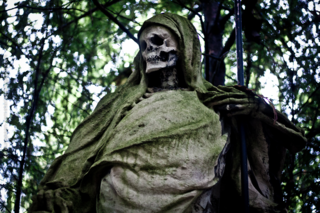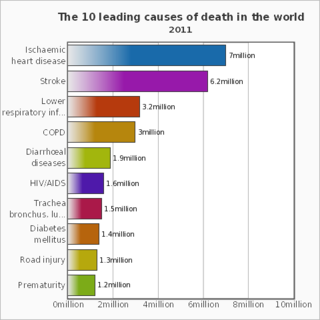
How Authors Die
I bet you've never thought of it, have you?
We know that many great musicians die at the age of twenty-seven of various indulgence related issues. Popular musicians, as a group of people, tend to expire at the hand of addiction.
But what about authors? How do they die?
Turns out there are two common ways authors die.
1. Heart disease - mostly stroke
2. Suicide
Of course, authors do die of other things. James Joyce died of a bleeding ulcer at 59 years old. He was a little tightly wound. And Kurt Vonnegut died from head trauma after a fall down the stairs at 84 years old. Agatha Christie died of "natural causes" at 84 years old and Oscar Wilde died of an infection, cerebral meningitis, at 46 years old.
While it does happen that authors die of other things, most authors die of heart disease or suicide.
Let's take a moment and look at the top 10 ways people die (according to the World Health Organization)

Yes, I see it too. The number one killer of human beings the world over is heart disease and the second is stroke.
Given that writers sit so much, it makes sense that so many of us die from heart disease. Sitting will kill you. Heart disease is just another reason you need to be fit.
Certainly, Mark Twain (heart attack at 74), Charlie Dickens (stroke at 58), Sir Arthur Conan Doyle (heart attack at 71), and Madeline L'Engle (cerebral hemorrhage at 88) were well within the standard for their time and age.
In fact, they may have lived longer than many of their peers.
What's up with the suicide thing? In fact, writers are twice as likely to kill themselves.
Authors seem to kill themselves for two specific reasons:
1. After having lived in pain for a length of time
2. Psychological illness - "madness," depression, despair.
Suicide as a retreat from physical pain:
Many authors have physical issues which leave them in tremendous physical pain. Earnest Hemmingway had a genetic condition called hemochromatosis which left him physically and mentally deteriorated. That combined with a lifelong alcoholism left the man in tremendous pain that was cured by a bullet.
Hunter S. Thompson lived with deteriorating health and incredible pain, due to a hip replacement, for such a long time that no one who knew him was surprised when he killed himself.
His suicide note read:
"No More Games. No More Bombs. No More Walking. No More Fun. No More Swimming. 67. That is 17 years past 50. 17 more than I needed or wanted. Boring. I am always bitchy. No Fun — for anybody. 67. You are getting Greedy. Act your (old) age. Relax — This won't hurt."
Suicide as a retreat from madness:
Let's face it. We sit in rooms alone and tell stories to ourselves. That's not exactly normal behavior.
Sylvia Plath (30 years old), Ned Vizzini (32 years old), Anne Sexton (45 years old), Virginia Woolf (59 years old), John Berryman (57 years old),... The list of authors who have killed themselves is long and continues to grow.
Despair is an occupational hazard of being an author.
The rise of popularity can only be followed by the fall into disinterest. This roller coaster of popularity lends itself to despair. When you're "good," they love you. When you're not "good," they don't.
Take a look at any book marketing course. Listen to any agent or publisher.
As a culture, we believe that quality of an authors work drives their popularity when in truth, many "great" authors never live to see the popularity of their work. Popularity has more to do with cultural zeitgeist than sheer talent of story telling.
Beyond the way the world appreciates our work, many authors are depressed. They come to writing as a way of expressing their own inner angst.
"When the researchers looked specifically at authors, they found that they are overrepresented among people with schizophrenia, depression, bipolar disorder, anxiety syndrome, and substance abuse problems." From "Mental Illness, Suicide, and creativity"
What's it going to be for you?
Are you going to let the despair eat you whole? Are you going to sit so long that heart disease is your middle name?
Now that we know what our likely end may be, we can do something about it.
What will you do?
This month, I will attempt to share thirty thoughts about writing - one a day for thirty days. (Missed 3 days when Typepad was attacked by a DDOS.)
Writing #1 : The difference between fiction and non-fiction
Writing #2 : Writing schedules.
Writing #4 : "You missed a comma" and the Copy Edit Banshees
Writing #5 : Do it now! Write your story. Share it with the world
Writing #6 : How to put down a writer with a smug smile on your face
Writing #7 : Myth about what "Publisher's used to" do
Writing #8 : Want to be a writer? Get fit
Writing #9 : Want live your dream of being a professional author? Stay inspired
Writing #10 : Why we quit Wordpress
Writing #11 : Ah Shit! Something blew up!
Writing #12 : Tools we use (instead of Wordpress)
Writing #14 : Writing is a lonely life
Writing #15 : Best way to rest your day? Take a nap!
Writing #16 : How not to be a lonely writer
Writing #17 : The writer's cloak is woven from threads of shame and humiliation.
Writing #18 : Why should I? Because you can!
The comments are turned off. If you have something to say, send me a tweet, catch me on Facebook or Google Plus.
-----
